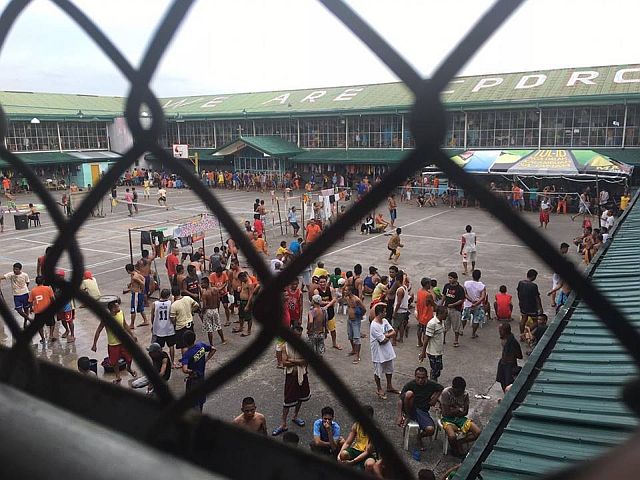
The number of inmates at the Cebu Provincial Detention and Rehabilitation Center (CPDRC) has reached 3,012 as of yesterday, which is 100 percent more than the minimum capacity of 1,500. (CDN PHOTO/JOSE SANTINO BUNACHITA)
Starting next week, the Cebu Provincial Detention and Rehabilitation Center (CPDRC) will temporarily stop accepting additional new inmates.
In a letter addressed to Senior Supt. Jose Macanas, Cebu Provincial Police Office (CPPO) director, CPDRC Jail Warden Romeo Manansala cited the overpopulation of the facility as the reason they would not be able to accept remanded inmates from the different municipal police offices in the province starting August 15.
“The current jail population is 3,008 which is beyond the minimum capacity of 1,500 inmates population,” read Manansala’s letter.
In fact, as of 4 p.m. yesterday, the number of inmates inside the CPDRC had already reached 3,012 since it is usually on Fridays when the CPDRC would accept inmates from the police.
Manansala said in an interview that the spate of police operations against alleged drug users and pushers was among the reasons of the increase in the number of the CPDRC’s inmates.
He said that of the total number of inmates in the facility, between 60 to 65 percent are facing drug-related charges.
PRO-7 chief reacts
Chief Supt. Noli Taliño, director of the Police Regional Office in Central Visayas (PRO-7), said they understood the predicament of the provincial jail and would look for ways to address the problem.
He said he would meet with jail officials to find a solution to the problem because the jail congestion would not be a reason for police to stop running after criminals.
“We could not stop our campaign especially against illegal drugs because we are given (by President Rodrigo Duterte) until six months to address crimes,” Taliño said.
Since July 1, 70,000 suspected drug users and pushers surrendered to the police in Central Visayas.
Of the number, Taliño said 30,000 are from Cebu province.
“Just imagine if those 30,000 individuals will be charged in court and will be detained at CPDRC. We need to sit down and talk with jail officials,” he said.
Health, jail expansion
For his part, Cebu Gov. Hilario Davide III pointed out that the overpopulation inside the CPDRC has caused the deterioration of the health of the inmates, some of whom have died.
“It’s very overcrowded already. And if we keep on receiving, if you recall, there had been incidents of deaths already there because some inmates developed respiratory problems due to the lack of space. So we want to avoid that,” Davide told reporters.
He said Provincial Engineer Hector Jamora was already designing an expansion and improvement of the CPRDC, where additional cells would be developed while existing ones would be rehabilitated.
The CPDRC has 119 cells, with each measuring 9 by 20 feet.
Manansala said each cell has 10 double-deck beds for 20 inmates, but due to the congestion they had to put 30 to 40 inmates in one cell.
Slow case resolution
Another reason for the jail congestion was the slow-paced resolution of inmates’ cases.
Davide, however, would try to address this with a Capitol-planned conference of judges, prosecutors, Philippine National Police, Philippine Drug Enforcement Agency and other concerned agencies to look for ways to expedite the trial process of inmates.
Although only temporary, Davide said he did not know when the suspension of receiving additional inmates would last.
Court orders
He, however, said that they might still receive inmates with court commitment orders to be placed in the CPDRC.
“We don’t have a choice because that’s the court. But for requests from municipal jails to transfer inmates to CPDRC since they are also congested, we will have to decline that,” he said.
But Manansala said the province should refuse even inmates with court commitment orders since all inmates brought to the CPDRC even those brought by the police had court orders.
“We don’t accept inmates with no court orders. I’ll have to talk to Gov. Davide again to explain to him that we can’t accept even those with court orders,” Manansala said. /With reports from Senior Reporter Ador Vincent S. Mayol and Correspondent Michaela Dolores